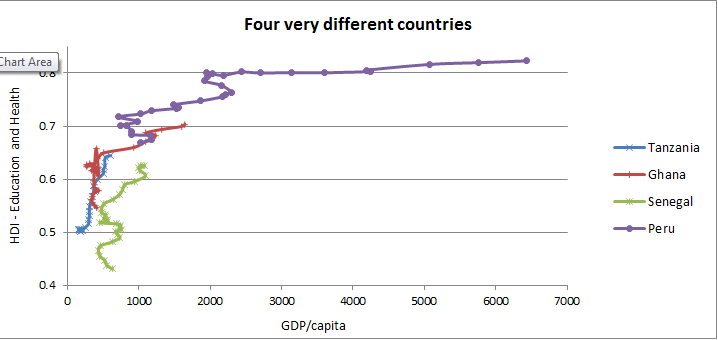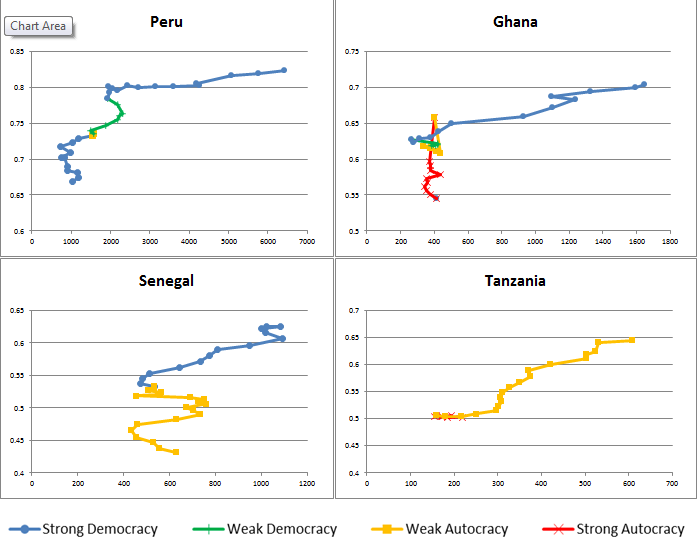Different countries, same challenges: Making sense of accountability challenges and extractive industries in Ghana, Peru, Senegal and Tanzania
 Main pit at Prestea mine owned by Bogoso Gold Mines, a subsidiary of Golden Star Resources. Despite being Africa's second largest producer of gold and generating millions in revenues, Ghana is not using its gold production to benefit the citizens living near mines. Photo: Neil Brander / Oxfam America.
Main pit at Prestea mine owned by Bogoso Gold Mines, a subsidiary of Golden Star Resources. Despite being Africa's second largest producer of gold and generating millions in revenues, Ghana is not using its gold production to benefit the citizens living near mines. Photo: Neil Brander / Oxfam America.
How the presence of extractive industries makes these four countries a lot more similar than you might think.
James Morrissey is an Extractive Industries and Governance Researcher at Oxfam America.
At first, Ghana, Peru, Senegal and Tanzania seem like very different countries. The size of their economies, as well as their trajectories towards democracy, are clearly distinct. One might think that the challenge of improving natural resource management in each country is also distinct. But new research from Oxfam is challenging this view, identifying common factors across the countries that appear to get in the way of translating extractive industry revenues into human development.
The new research suggests that instead of focusing simply on the formal laws and policies guiding natural resource management, and on the existence of formal accountability institutions created to implement those laws; efforts also need to be made that attempt to understand the context in which these laws exist, the power of the actors involved in implementing them and the incentives which link laws and policies to actual outcomes.
As a result, early findings from this research suggest that rather than simply creating new policies, laws and oversight institutions, efforts to improve natural resource management also need to focus on redistributing power, and changing the incentives of those responsible for implementing them.
The graph below shows my calculations, based on UNDP data, on the relationship between the human development and GDP per capita, for the four countries. Each node on the above graphs is a year, starting at 1980 and ending in 2012. As a result these lines show how countries have grown (in terms of GDP/capita) and developed (in terms of life expectancy and access to education) over the last 32 years. We can clearly see the three poorer African economies as distinct from Peru. We can also see that Ghana, like Peru, has seen worse human development returns on growth since around the year 2000. Finally Senegal appears to have done a generally poorer job of translating greater economic activity into human development than both Tanzania and Ghana.

These graphs show the same thing as the above graph, comparing GDP/capita with human development, except now they are broken down by country, and we have overlaid democratic conditions (measured using the Polity Score from the Polity IV data set) – so you can see how these change through time (again each node on the line is a year, from 1980-2012). Again, while it is clear that these countries have all improved in terms of this measure of democracy, it is notable how different the trajectory of each country is.

Growth, Natural Resources and Development
Growing activity in mining as well as oil and gas exploitation, is an important driver of growth in many developing countries. In addition, these industries generate significant revenues for developing country governments. As a result, resource rich countries have at their disposal a means to support the cost of pro-poor social expenditure programs such as the building of schools, the training of doctors, and the supply of equipment to teachers, nurses and farmers. The challenge is making sure this growth is translated into improvements in human development.
Oxfam has recently examined the management of natural resources in these four very different countries. What we found was a remarkably common set of challenges:
The president calls the shots
While the countries have very different levels of democracy, they all have political systems in which power is centralized within the office of the president. In all cases parliament is relatively weak and does a poor job of keeping the power of the president in check. In some countries this power is legally enshrined, while in others it is the product of broken incentives. In Tanzania, for example the president has the power to dissolve parliament if they refuse to ratify the budget. In Senegal, party discipline is the result of MPs having to be supported by an established party if they wish to stand for election. This limits the interest of ruling party MPs from sanctioning the president, as they potentially risk their seat in future elections if they do so.
…and so do the ministers
The strength of the president’s office, and the fact that the president has the ability to appoint ministers, results in ministers also being able to act with a significant amount of autonomy. For example, in Tanzania, the Minister of Minerals and Energy has effective powers to sign on contracts with extractive industry companies, without having to consult any other government authority. Similarly, in all countries, the Ministry of Finance has an almost unfettered ability to set budget allocations, regardless of documents, or procedures which are meant to guide allocations – such a Medium Term Expenditure Frameworks, Long Term Development Plans, or even expenditure commitments – such as the Maputo declaration.
Not enough sunlight
The countries vary in terms of their transparency requirements, however in all cases, transparency standards are not sufficient to allow citizens to ensure that natural resource wealth and public finances are being used responsibly. This might seem striking to readers familiar with Peru, who will note that the country has implemented a host of transparency initiatives, and even passed access to information legislation. This legislation however does not extend to companies. In addition, the research revealed that many government bodies in Peru simply ignored access to information requests (including one to the ombudsperson who is meant to ensure requests are honored!), and noted that there is no sanction for administrators who fail to comply. In addition, for all the countries, even where transparency requirements do exist, record keeping, especially at the local level where services are delivered, is very poor. This makes the task of addressing, or even identifying, budget leakage very difficult.
Checks and balances don’t work
The result of a strong executive, dysfunctional parliament, and limited transparency, is that any sort of oversight on government power is limited. Citizen action is compromised by a lack of access to information, while the state’s own institutions of accountability are dysfunctional. Across the countries, audit institutions are compromised by the fact that the president tends to appoints their leadership. In addition these institutions tend to be underfunded, lack prosecutorial authority and are limited in terms of the information they can access. This is in spite of the fact that all the countries have undertaken extensive anti-corruption reforms, and have formally reduced the power of the executive.
Decentralization in name only
All the countries have undertaken exercises which are nominally aimed at decentralizing government and focused on increasing participation. In the three African cases, this decentralization has been compromised by the ability of the executive to make appointments to local government bodies, and by systems of patronage which tie access to resources to political compliance. Peru tells a different story, but the mission of increased participation through decentralization appears to have been limited there by dysfunctional local political institutions.
Countries can’t win when mineral prices increase
Despite the centralization of power in each country, all the countries have struggled to fully capitalize on the increase natural resource revenues stemming from the commodity price boom. Notably, in all cases this does not appear to simply be the result of an apparent lack of political will. Instead, it seems that the coincidence of structural adjustment, the increasing internationalization of capital and depressed commodity prices in the early 1990s all conspired to result in countries locking themselves into generous contracts with extractive companies. While countries have been able to change the terms on which future contracts will be negotiated, the renegotiation of existing contracts has been thwarted by fears of alienating foreign capital.
So what is going on?
Considering all of the above, three major reflections begin to stand out in the study. The first is that there is an important difference between rules, as they exist on paper, and what happens in reality. Notably, all the countries have undertaken admirable reforms around democratic conduct and corruption, yet the new institutions which have been created are unable to exercise power and restrain unaccountable decision-making, and even corrupt activity.
It seems that genuine improvements in governance have complex causes. This work has yet to fully understand the processes driving positive changes, but it seems that relationships between the institutions, rather than the rules within an institution, are what matters. For example, the Controller and Auditor General, in Tanzania, had its independence enshrined in the constitution since its formation in the 1970s. It is only recently however that this independence is beginning to be exerted to the ends of pursuing corruption. This suggests that improving governance is not just about making better rules, but also about influencing the context in which those rules exist.
What these findings suggest is that rules and laws don’t simply determine power. Likewise power is not only exercised by setting the rules. Rather outcomes are driven by the power relations between institutions, so that influence comes both from making the rules, and from the incentives which link the rules to outcomes.
The full Oxfam study is due to be published in November 2015. Please contact me if you have questions about this work.
Editorial note: This post was amended on 2 July 2015 to account for an error in describing the exact state of transparency requirements in Peru.